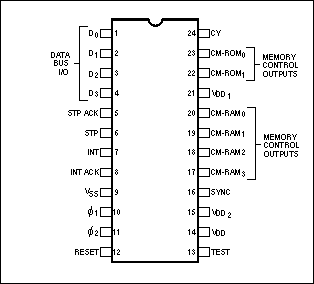

4040
MCS-40 Family
| Introduction date: | Late 1974 | |
| Category: | 4-bit microprocessor (8-bit instructions) | |
| Frequency: | 500KHz - 740KHz | |
| Technology: | P-channel silicon gate MOS technology | |
| Number of transistors: | 3,000 (10 microns) | |
| Addressable memory: | 8192x8-bit ROM and 1024x4-bit RAM | |
| Number of instructions: | 60 with a 8 level stack, 24x4-bit (or12x8-bit) registers and interrupt abilities | |
| History:
|
The 4040 is an enhanced version of the 4004.
|
|
| Second source: | No second source or clones was ever made of the 4040 CPU. |
| Intel | |||||
| C4040 | C4040 | ||||
|
|
|
||||
| 7551 | Malaysia 7614 |
||||
| D4040 | D4040 | D4040 | |||
|
|
|
|
|||
| (No copyright) Malaysia 7634 |
(#1 pin indicator) PHILIPPINES 8015 |
PHILIPPINES 8118 |
|||
| P4040 | |||||
|
|
|||||
| Philippines 7835 |
 |
|
|
Pin configuration |
MCS-40 family
The MCS-40 family was a set of devices to make it possible to build a
complete computer system.
| 4008/4009 | standard memory and I/O interface set |
| 4040 | 4-bit Central Processor Unit with 60 instructions |
| 4101 | 256 x 4 RAM |
| 4201 | clock generator |
| 4265 | programmable general purpose I/O device |
| 4269 | programmable keyboard display device |
| 4289 | standard memory interface |
| 4308 | 1024-bit mask programmable ROM and four 4-bit I/O Ports |
| 4316/2316 | 2048-bit ROM |
| 4702/1702 | 2048-bit Erasable and Electrically Reprogrammable MOS ROM (Static) |